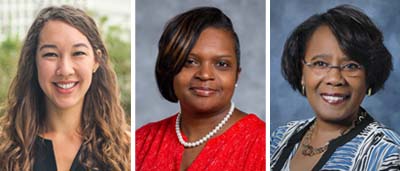Betty Irene Moore Fellows awarded Health Equity Innovations Fund grants
Nurse leaders’ projects focus on addressing health disparities and racism
Jan. 20, 2023
 Betty Irene Moore Fellows Kristen Choi and Fayron Epps received Health Equity Innovations Fund awards along with Fellowship National Advisory Council member Bernice Coleman.
Betty Irene Moore Fellows Kristen Choi and Fayron Epps received Health Equity Innovations Fund awards along with Fellowship National Advisory Council member Bernice Coleman.
Three nurse leaders associated with the Betty Irene Moore Fellowship for Nurse Leaders and Innovators received Health Equity Innovations Fund awards Jan. 10 from the AARP Center for Health Equity through Nursing and the Future of Nursing: Campaign for Action. This is an initiative of the AARP Foundation, AARP, and the Robert Wood Johnson Foundation.
Projects led by 2022 cohort Betty Irene Moore Fellows Fayron Epps, assistant professor at the Emory University Nell Hodgson Woodruff School of Nursing, and Kristen Choi, assistant professor at the UCLA School of Nursing, were among the 16 selected nationwide for funding. They are joined by Fellowship National Advisory Council member Bernice Coleman, director of Nursing Research and an assistant professor for Cedars-Sinai, who also received project funding.
Highly competitive award process
The awards are the first of their kind offered by the sponsoring organizations and are designed to help eliminate structural inequalities and racism within health care systems, while also improving access to care for communities disproportionally impacted by health disparities. Projects also advance the recommendations outlined in “The Future of Nursing 2020-2030: Charting a Path to Achieve Health Equity” report published by the National Academy of Medicine.
Fellowship National Advisory Council member Susan Reinhard, senior vice president and director of the AARP Public Policy Institute and chief strategist at the Center to Champion Nursing in American and Family Caregiving Initiatives, said there was a robust response to the call for grant applications and the grants process featured multiple layers of review.
“Our review panel found that this applicant pool was very competitive and we were excited to see so many creative ideas from across the country. I am thrilled that Drs. Epps, Choi and Coleman were selected for their compelling projects,” Reinhard said.
Projects tackle health disparities and racism
Epps' project focuses on expanding the Alter program, which is a faith-based dementia awareness program that partners with churches and communities to support African American families as they navigate a dementia diagnosis. The award expands upon her fellowship project, which focuses on optimizing outcomes for Black dementia caregivers.
“This project strives to improve the health of communities by mitigating structural racism and inequities that have led to significant health disparities within the African American community,” Epps said. “Faith communities who commit to partnering with us receive customized support and education from content experts and a stipend to help offset the cost of delivering the program. Program uptake within African American faith communities will forge dementia-friendly supportive relationships and convoys of care, allowing families to not feel like they are facing dementia alone.”
Choi’s project focuses on early childhood interventions that can ultimately have positive effects on mental health. She hopes to demonstrate the effectiveness of a tax filing app paired with nurses as trusted messengers to aid low-income parents with young children in maximizing their tax credits. Along with her fellowship project on mental health care and tele-mental health for LGBTQ youth, she advances health equity and access.
“Tax credits like the Earned Income Tax Credit provide families with direct material support that is associated with reduced racial disparities in child health. However, mechanisms of structural racism create barriers to tax filing and families in marginalized communities may miss out on tax credits,” Choi said. “Our project is a multi-sector partnership with an impact-driven financial start-up, Let’s Get Set, to increase receipt of tax credits among low-income families through partnerships with health care workers. We hope this project empowers nurses with tools to address a policy-based manifestation of structural racism in the tax code and helps families receive direct cash.”
Coleman’s project with the Cedars-Sinai Health System focuses on implementing virtual interpretation services for advanced practice nurses to utilize during in-home visits with low-income older adults. Coleman is a nurse researcher known for her dedication to improving health disparities and exploring the racial outcomes of post-heart transplantation in African American and Caucasian communities.
Heather M. Young, fellowship national program director, said she is excited to see these three leaders addressing health inequities earn support at the national level.
“These projects led by Drs. Epps, Choi and Coleman advance innovation and community engagement in important ways to improve health equity,” Young said.





